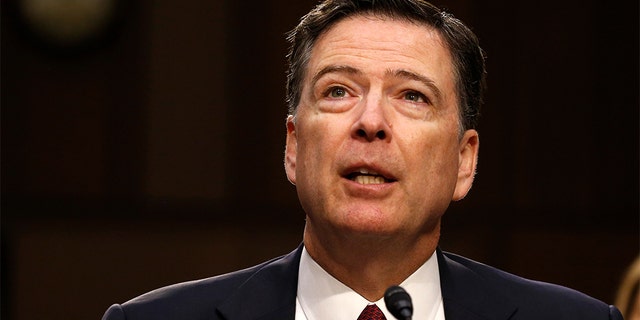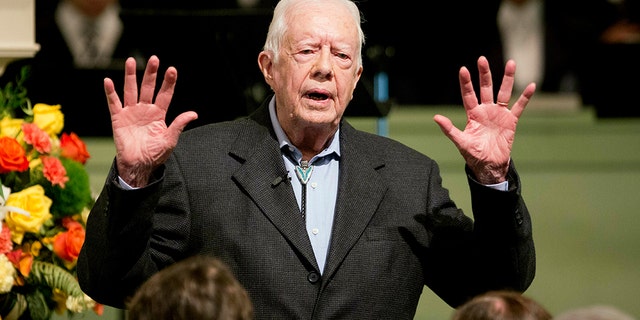Former Attorney General
Loretta Lynch has flatly accused former FBI Director
James Comey
of mischaracterizing her statements by repeatedly alleging, under oath,
that Lynch privately instructed him to call the Hillary Clinton email
probe a "matter" instead of an "investigation."
Lynch,
who testified that Comey's claim left her "quite surprised," made the
dramatic remarks at a joint closed-door session of the House Oversight
and Judiciary Committees last December. A
transcript of her testimony was released on Monday by House Judiciary Committee ranking member Doug Collins, R-Ga.
The episode marked the latest
public dispute
to break out among high-level ex-Obama administration officials, as
multiple government reviews of potential FBI and Justice Department
misconduct continue.
In a June 2017
interview under oath
with the House Intelligence Committee, Comey said Lynch had pressed him
to downplay the significance of the Clinton email review in September
2015, just before a congressional hearing in which Comey was expected to
be asked about the investigation. Comey said the moment led him to
question her independence and contributed to his decision to
unilaterally hold a press conference in July 2016 announcing the
conclusions of the probe.
“The attorney general had directed me
not to call it an investigation, but instead to call it a matter, which
confused me and concerned me," Comey testified. “That was one of the
bricks in the load that led me to conclude, ‘I have to step away from
the department if we’re to close this case credibly.’”
Comey
continued: “The Clinton campaign, at the time, was using all kind of
euphemisms — security review, matters, things like that, for what was
going on. We were getting to a place where the attorney general and I
were both going to have to testify and talk publicly about. And I wanted
to know, was she going to authorize us to confirm we had an
investigation? ... And she said, ‘Yes, but don’t call it that, call it a
matter.' And I said, ‘Why would I do that?’ And she said,
‘Just call it a matter.’”
Comey
said that Lynch's secret airport tarmac meeting with Bill Clinton in
the summer of 2016 later cemented his assessment that Lynch lacked
independence.
But in her testimony in December, Lynch said Comey had completely mischaracterized the situation.
Former FBI Director James Comey testifies before a Senate
Intelligence Committee hearing on Russia's alleged interference in the
2016 U.S. presidential election on Capitol Hill in Washington, U.S.,
June 8, 2017. (Reuters)
"I did not," Lynch responded when asked if she had "ever" told Comey to call the investigation a "matter."
"I
have never instructed a witness as to what to say specifically. Never
have, never will," Lynch continued. "In the meeting that I had with the
Director, we were discussing how best to keep Congress informed of
progress and discuss requesting resources for the Department overall. We
were going to testify separately. And the concern that both of us had
in the meeting that I was having with him in September of 2015 was how
to have that discussion without stepping across the Department policy of
confirming or denying an investigation, separate policy from
testifying.
"Obviously, we wanted to testify fully, fulsomely, and
provide the information that was needed, but we were not at that point,
in September of 2015, ready to confirm that there was an investigation
into the email matter -- or deny it," Lynch added. "We were sticking
with policy, and that was my position on that. I didn't direct anyone to
use specific phraseology. When the Director asked me how to best to
handle that, I said: What I have been saying is we have received a
referral and we are working on the matter, working on the issue, or we
have all the resources we need to handle the matter, handle the issue.
So that was the suggestion that I made to him."
Pressed for her reaction to Comey's statements, Lynch said they had come as a shock.
"I
was quite surprised that he characterized it in that way," Lynch said.
"We did have a conversation about it, so I wasn't surprised that he
remembered that we met about it and talked about it. But I was quite
surprised that that was his characterization of it, because that was not
how it was conveyed to him, certainly not how it was intended."
House Oversight Commitee ranking member Jim Jordan, R-Ohio -- then the panel's chairman -- interjected.
"Excuse
me. Ms. Lynch, so in the meeting with the FBI Director you referred to
the Clinton investigation as a matter -- I just want to make sure I
understand -- but you did not instruct the Director when he testified in
front of Congress to call it a matter. Is that accurate?" Jordan asked.
"I
said that I had been referring to -- I had been using the phraseology,"
Lynch responded. "We've received a referral. Because we received a
public referral, which we were confirming. And that is Department
policy, that when we receive a public referral from any agency, that we
confirm the referral but we neither confirm nor deny the investigation.
That's actually a standard DOJ policy.
"So in the meeting with the
Director, which was, again, around September -- I don't recall the date
-- of 2015, it was very early in the investigation, I expressed the
view that it was, in my opinion, too early for us to confirm that we had
an investigation," Lynch said. " At some point in the course of
investigations, as you all know from your oversight, it becomes such
common knowledge that we talk about it using the language of
investigation and things, but at that point we had not done that and we
were not confirming or denying it. We weren't denying it at all. There
was, just essentially, in my view, we were following the policy. And
when the Director asked me about my thoughts, I said, yes, we had to be
-- we had to be completely cooperative and fulsome with Congress for
both of us, and that we needed to provide as much information as we
could on the issue of resources."
Last week, a high-level dispute over which senior government officials pushed the unverified
Steele dossier amid efforts to surveil the Trump campaign broke out into the open, after it emerged that Attorney General
William Barr appointed a U.S. attorney to
examine the origins of the Russia investigation and determine if the FBI and DOJ's actions were "lawful and appropriate."
Sources
familiar with the records told Fox News that a late-2016 email chain
indicated Comey told bureau subordinates that then-CIA Director
John Brennan insisted
the dossier be included in the intelligence community assessment on
Russian interference, known as the ICA. But in a statement to Fox News, a
former CIA official put the blame squarely on Comey.
A separate,
comprehensive report from the Justice Department Inspector General (IG)
into possible FBI and DOJ misconduct and surveillance abuse is expected
within a matter of weeks.















